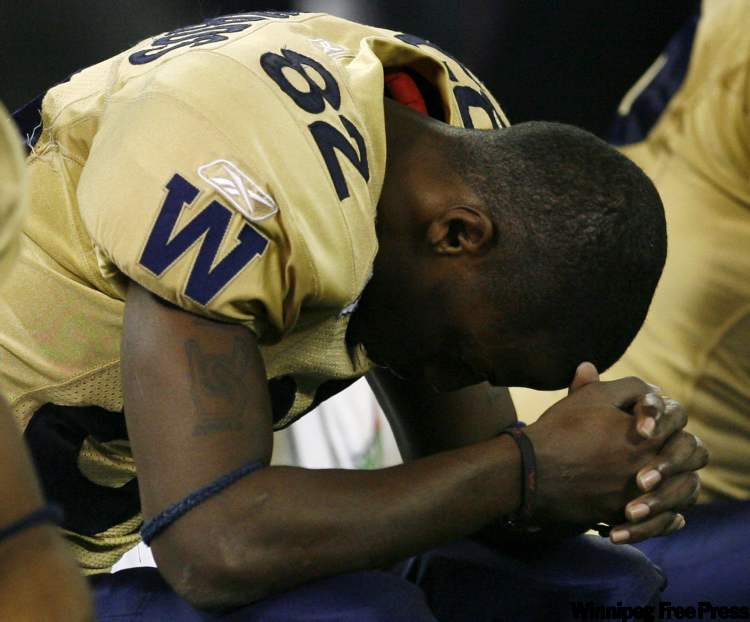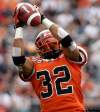Sore winners
Winnipeg teams have been to the big game more than their share -- they just haven't won
Advertisement
Read this article for free:
or
Already have an account? Log in here »
To continue reading, please subscribe:
Monthly Digital Subscription
$0 for the first 4 weeks*
- Enjoy unlimited reading on winnipegfreepress.com
- Read the E-Edition, our digital replica newspaper
- Access News Break, our award-winning app
- Play interactive puzzles
*No charge for 4 weeks then price increases to the regular rate of $19.00 plus GST every four weeks. Offer available to new and qualified returning subscribers only. Cancel any time.
Monthly Digital Subscription
$4.75/week*
- Enjoy unlimited reading on winnipegfreepress.com
- Read the E-Edition, our digital replica newspaper
- Access News Break, our award-winning app
- Play interactive puzzles
*Billed as $19 plus GST every four weeks. Cancel any time.
To continue reading, please subscribe:
Add Free Press access to your Brandon Sun subscription for only an additional
$1 for the first 4 weeks*
*Your next subscription payment will increase by $1.00 and you will be charged $16.99 plus GST for four weeks. After four weeks, your payment will increase to $23.99 plus GST every four weeks.
Read unlimited articles for free today:
or
Already have an account? Log in here »
Hey there, time traveller!
This article was published 02/10/2010 (5520 days ago), so information in it may no longer be current.
With the Winnipeg Blue Bombers well on their way to yet another lost season, it now seems safe to say that the championship drought for this city’s three professional sports teams will extend into 2011.
That’s a 17-year drought, extending all the way back to the 1994 Northern League championship the Winnipeg Goldeyes won in their inaugural year. That’s now longer than the infamous 16-year championship drought Toronto sports fans endured between the Leafs winning the Stanley Cup in 1967 and the Argos winning the Grey Cup in 1983.
And it will get us within one year of the 18-year mind-numbing drought inflicted upon sports fans in Regina between the Saskatchewan Roughriders winning Cups in 1989 and 2007.

So with that as a backdrop, now seemed as good a time as any to examine why a city like ours — with a population approaching three-quarters of a million and a reliable, if unspectacular, fan base — cannot seem to produce a winner.
The answer that emerges is actually a bit surprising. Put in its simplest terms, it’s not so much that we suck, it’s that we choke.
Consider the evidence: In the 16 years since the Goldeyes won that 1994 title, Winnipeg sports teams have been to nine finals — the Manitoba Moose played in a Calder Cup final once; the Blue Bombers played in two Grey Cups; and the Winnipeg Goldeyes played in six Northern League finals.
And our record in those nine finals since 1994? 0-9.
That’s right — 0-and-9. Woe-and-nine. Oh-fer. Call it what you want, you’ve almost got to be trying to lose to dump nine straight opportunities to win a championship.
Two in a row? Happens all the time. Four in a row? Absolutely — that’s the record of both the Buffalo Bills and Minnesota Vikings in Super Bowls, for instance. Eight-in-a-row? That’s rarified company, but it’s actually happened around these parts once before when the Bombers lost eight Grey Cups in a row — 1942, 1943, 1945, 1946, 1947, 1950, 1953 and 1957.
But nine in a row? You’ve got to start calling up the likes of such lovable losers as soap opera star Susan Lucci — who got a four-minute standing ovation in 1999 when she finally won an Emmy Award on her 19th nomination — to find that kind of streak of losing when it counted most.
And it’s actually even worse than just 0-9. If you count the two Bomber losses in the 1992 and 1993 Grey Cups, the Bombers have lost four straight Grey Cups and Winnipeg teams overall are 1-11 in their last 12 appearances in the big game.
Now, on the one hand, advancing to 12 finals between that 1992 Grey Cup and 2009 — when the Moose lost to Hershey in the Calder Cup final — is actually quite impressive and a clear indication that the quality of Winnipeg sports teams is generally high.
Indeed, 12 appearances in a final in a period of just 17 years is an average of better than two finals every three years — a remarkable success rate for a city with just three pro sports teams and one that rivals even championship hotbeds like Edmonton in Canada and Boston, lately, in the U.S.
What’s more, our amateur athletes certainly have no trouble rising to the occasion. Curler Jennifer Jones, for instance, has played in five Canadian curling finals and won four of them.
So the problem then is not systemic — it is clearly not a case, for instance, that we simply cannot afford as a city to produce the kind of quality teams that win championships. On the contrary, we seem to do well above average in that regard, both professionally and at the amateur level.
Now, it is true that there have been some lean years most recently, of course. The Goldeyes haven’t won a playoff series of any kind in seven years and counting now and have missed the playoffs entirely in three of those years. The Bombers have been awful for three straight seasons. The Moose are coming off a poor season that saw them punted in the first round.
But regarded in the context of the bigger picture, these last few years look like blips on a longer-term chart that suggests we can more than hold our own as a city in pro hockey, football and baseball.
The larger issue, it seems, is just that we cannot seem to win the Big One. Call it bad luck, call it choking, call it an unbelievably bad run of completely unrelated circumstances — whatever you call it, it is a call for help.
But the problem is that even a leading North American expert in sports psychology doesn’t think there’s much he could do to help us. “Are you a city of losers? Is that what you’re asking?,” laughs Dr. Jay Granat, author of the book, Who Will Win the Big Game?
“No I don’t think so…You can definitely get that within a team. A team that’s been losing for five or six years, after a certain point they start to wonder.
“But I don’t think it crosses over from sport to sport and (can infect a whole city).”
Based in New Jersey, Granat is a psychotherapist who has worked with pro golfers, tennis players and Olympians to train them to rise to the big occasion.
He says our teams’ troubles in the big games may be the result of similar problems across organizations, but are ultimately coincidental to one another.
“It’s more likely a function of ownership mistakes and players’ mistakes than say, bad karma… Some coaches and managers and players play to avoid losing as opposed to playing to win.
“There is great value in winning the big game. Having been there before and succeeded, there becomes a sense that they can handle the pressure and respond in the big games.
“But the opposite is also true when you have lost the big game. There is an erosion of confidence that takes place that can have the inverse effect.”
Goldeyes GM Andrew Collier, whose club accounts for two-thirds of those recent losses in the big game says he’s as baffled as anyone as to why it keeps happening.
“It was different managers and different players,” Collier says. “If it was the same group every year, maybe you could pinpoint it.
“It was a completely different team every year. It’s hard to explain,” Collier continued. “I don’t believe in luck. I think you make your own luck. It’s just one of those things where not necessarily the best team wins every year.”
Moose GM Craig Heisinger went even further. “There’s no bigger picture. You’re looking for something that’s just not there.
“I don’t think it’s any kind of hex or black cloud hanging over us. We just have to find a way to win — that’s all.”
And besides, Heisinger offers, after the darkest clouds comes the brightest sunshine.
“These things have a tendency to work themselves out,” he says. “And I’m sure there will be a run coming the other way.”
The long-suffering sports fans of Winnipeg can only hope.
paul.wiecek@freepress.mb.ca





